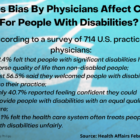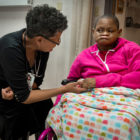Disparities
Physicians’ Biases, Lack Of Knowledge Are Partly To Blame For Health Care Disparities Among People With Disabilities
|
Jennifer Lortie is accustomed to facing obstacles to health care. The 37-year-old assistive technology specialist for United Cerebral Palsy of Eastern Connecticut has cerebral palsy. As she describes it, her condition, which resulted in quadriplegia, means “pretty decent use of my left arm, very limited [use] of right arm, and no use of my legs.”
Lortie has worn glasses since she was a young girl; when she was smaller, her father would carry her up the steps of the eye doctor’s office, which wasn’t handicap accessible. When that became unfeasible, she had to find another eye doctor. People with disabilities have long experienced inadequate access to health care.

